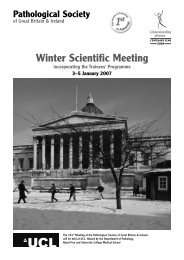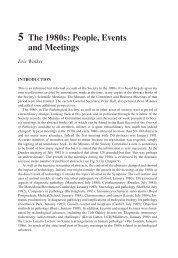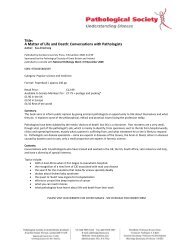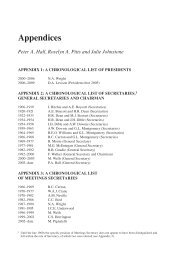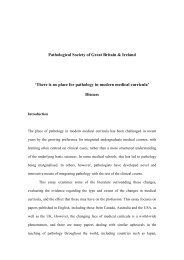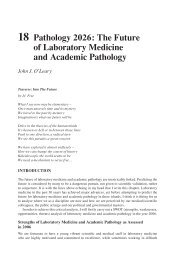2004 Summer Meeting - Amsterdam - The Pathological Society of ...
2004 Summer Meeting - Amsterdam - The Pathological Society of ...
2004 Summer Meeting - Amsterdam - The Pathological Society of ...
You also want an ePaper? Increase the reach of your titles
YUMPU automatically turns print PDFs into web optimized ePapers that Google loves.
125<br />
Assessing Inter-observer Variation In <strong>The</strong> Reporting Of Local<br />
Peritoneal Involvement (LPI) In pT3 and pT4 Colon<br />
Carcinoma<br />
S. E Littleford , A Baird , A Cairns , O Rotimi , C Verbeke , N<br />
Scott<br />
Leeds General Infirmary and St. James's University Hospital, Leeds,<br />
United Kingdom<br />
Background and Aim: LPI has been found to be one <strong>of</strong> the strongest<br />
independent predictors <strong>of</strong> recurrence <strong>of</strong> Dukes’ B colon cancer and provides a<br />
potential means <strong>of</strong> selecting patients for adjuvant therapy. However, substantial<br />
variation in the frequency <strong>of</strong> LPI reporting has been documented between<br />
histopathology departments. Shepherd et al. have proposed a grading system for<br />
the assessment <strong>of</strong> LPI. This study aimed to validate this grading system by<br />
determining the degree <strong>of</strong> inter-observer variation in the reporting <strong>of</strong> LPI.<br />
Methods: 60 cases <strong>of</strong> pT3 and pT4 colon carcinomas diagnosed in 2001 were<br />
identified from a pathology database. Three specialist gastrointestinal<br />
pathologists independently assessed representative H & E slides <strong>of</strong> the closest<br />
tumour proximity to the peritoneal surface according to Shepherd et al. Kappa<br />
statistics were performed to assess the degree <strong>of</strong> inter-observer agreement.<br />
Results: Inter-observer agreement on LPI grading ranged from = 0.60<br />
(moderate) to = 0.83 (almost perfect).<br />
Conclusions: This study validates the proposed grading system for LPI. Using<br />
this grading system there is excellent agreement between specialist<br />
gastrointestinal pathologists in the reporting <strong>of</strong> LPI in patients with pT3 and<br />
pT4 colon carcinoma. This grading system can therefore be recommended to<br />
assess LPI in these patients.<br />
126<br />
Analysis Of DNA Copy-Number Changes At 8q23-q24 In<br />
Colorectal Cancer By MLPA<br />
T.E. Buffart 1 , J. C<strong>of</strong>fa 1 , M.A.JA Hermsen 1 , B. Carvalho 1 ,<br />
J.P. Schouten 2 , G. Pals 2 , B. Ylstra 3 , G.A. Meijer 1<br />
1 Dept. Pathology, VU University Medical Center, <strong>Amsterdam</strong>,<br />
Netherlands, 2 MRC-Holland, <strong>Amsterdam</strong>, Netherlands, 3 Micro-array<br />
Core Facility, VU University Medical Center, <strong>Amsterdam</strong>, Netherlands<br />
C-myc (8q24.1) and PRL-3 (8q24.3) were found to be amplified in colorectal<br />
cancer metastasis. In addition, other oncogenes at 8q23-24 might be involved.<br />
<strong>The</strong> present study aims to analyse DNA copy number changes at 8q23-24 in<br />
colorectal cancer at high resolution in correlation to metastatic disease.<br />
DNA from 32 primary colorectal tumours and corresponding liver metastasis<br />
(when present) was isolated. A chromosome 8 specific MLPA probe mixture<br />
was used.<br />
Significant differences in DNA copy number were found in the genes MOS<br />
(p=0.04), MYC (p=0.01), DDEF1 (p



